Launch of the First Indigenous-Led Antarctic Research Programme at International Conference
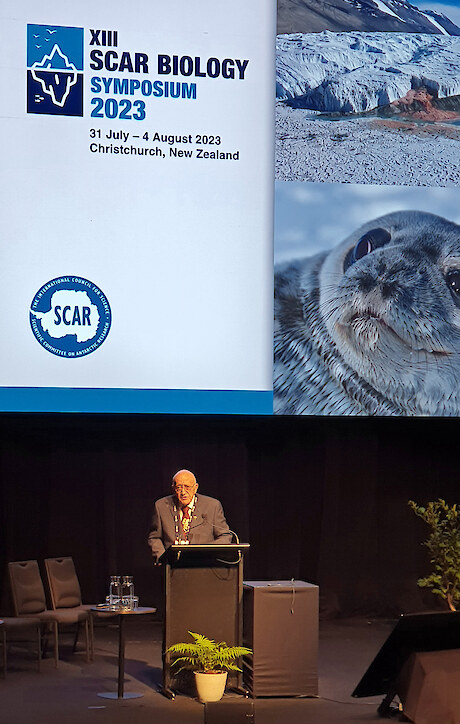 Tā Tipene O’Regan at the XIII SCAR Biology Symposium in Ōtautahi Christchurch. SCAR stands for the Scientific Committee for Antarctic Research, a global science association.This week, the XIII SCAR Biology Symposium attracted leading Antarctic scientists from all over the world to the new Te Pae Convention Centre in Ōtautahi Christchurch. SCAR, or the Scientific Committee for Antarctic Research, has held its conferences in New Zealand before, but this was the first time an entire half-day was dedicated to showcasing Māori exploration and research in the Deep South, including the official launch of the first indigenous-led Antarctic research programme in the world, Murihiku ki Te Tonga.
Tā Tipene O’Regan at the XIII SCAR Biology Symposium in Ōtautahi Christchurch. SCAR stands for the Scientific Committee for Antarctic Research, a global science association.This week, the XIII SCAR Biology Symposium attracted leading Antarctic scientists from all over the world to the new Te Pae Convention Centre in Ōtautahi Christchurch. SCAR, or the Scientific Committee for Antarctic Research, has held its conferences in New Zealand before, but this was the first time an entire half-day was dedicated to showcasing Māori exploration and research in the Deep South, including the official launch of the first indigenous-led Antarctic research programme in the world, Murihiku ki Te Tonga.
On a chilly morning, cold enough to remind everyone of their proximity to Te Tiri o Te Moana, an international audience listened with fascinated attention to Tā Tipene O’Regan as he outlined the concept of mātauranga. Knowledge and insight gained through careful study of the natural world was encoded in stories that served to order, store, and transmit information in the absence of the written word. Continuing this legacy of scientific inquiry, Ngāi Tahu are increasingly turning their attention south to Te Moana-tāpokopoko-a-Tāwhaki.
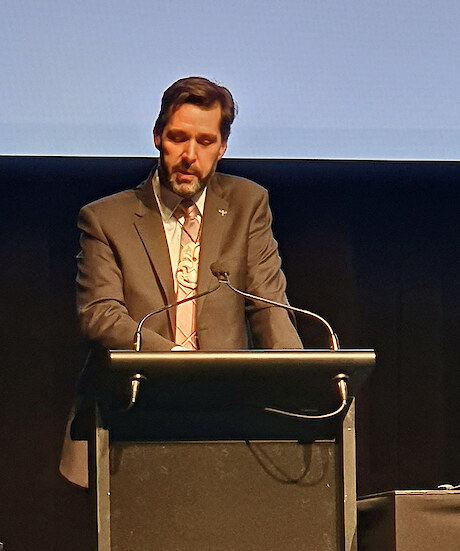 Dr Michael Stevens delivered a keynote address entitled, “Convergence Zones and Convergence Cultures: Ngāi Tahu and Southern Ocean World”Tā Tipene’s masterful exposition was followed by a waiata tautoko before the stage was turned over to Dr Michael Stevens and his keynote address elucidating the long-standing and intricate relationships southern Kai Tahu have with the islands and seas south of Bluff. He spoke of the cultural significance of the annual tītī harvest and how the synthesis of mainstream science and the muttonbirders’ careful records may be key to predicting one of the most important global climate cycles, the El Niño Southern Oscillation (ENSO). Archaeological research by Ngāi Tahu researchers established the presence of early Polynesian explorers in the Subantarctic Islands, defining the southern vertex of the great Pacific migration. Men from Rakiura were among the first people to travel to the Antarctic Continent, and Ngāi Tahu were among the whalers and sealers that explored the Southern Ocean long before modern science turned its attention to the region.
Dr Michael Stevens delivered a keynote address entitled, “Convergence Zones and Convergence Cultures: Ngāi Tahu and Southern Ocean World”Tā Tipene’s masterful exposition was followed by a waiata tautoko before the stage was turned over to Dr Michael Stevens and his keynote address elucidating the long-standing and intricate relationships southern Kai Tahu have with the islands and seas south of Bluff. He spoke of the cultural significance of the annual tītī harvest and how the synthesis of mainstream science and the muttonbirders’ careful records may be key to predicting one of the most important global climate cycles, the El Niño Southern Oscillation (ENSO). Archaeological research by Ngāi Tahu researchers established the presence of early Polynesian explorers in the Subantarctic Islands, defining the southern vertex of the great Pacific migration. Men from Rakiura were among the first people to travel to the Antarctic Continent, and Ngāi Tahu were among the whalers and sealers that explored the Southern Ocean long before modern science turned its attention to the region.
The morning session was concluded by a brief but fabulous kapa haka performance led by David Brennan, which was received with great enthusiasm by the audience.
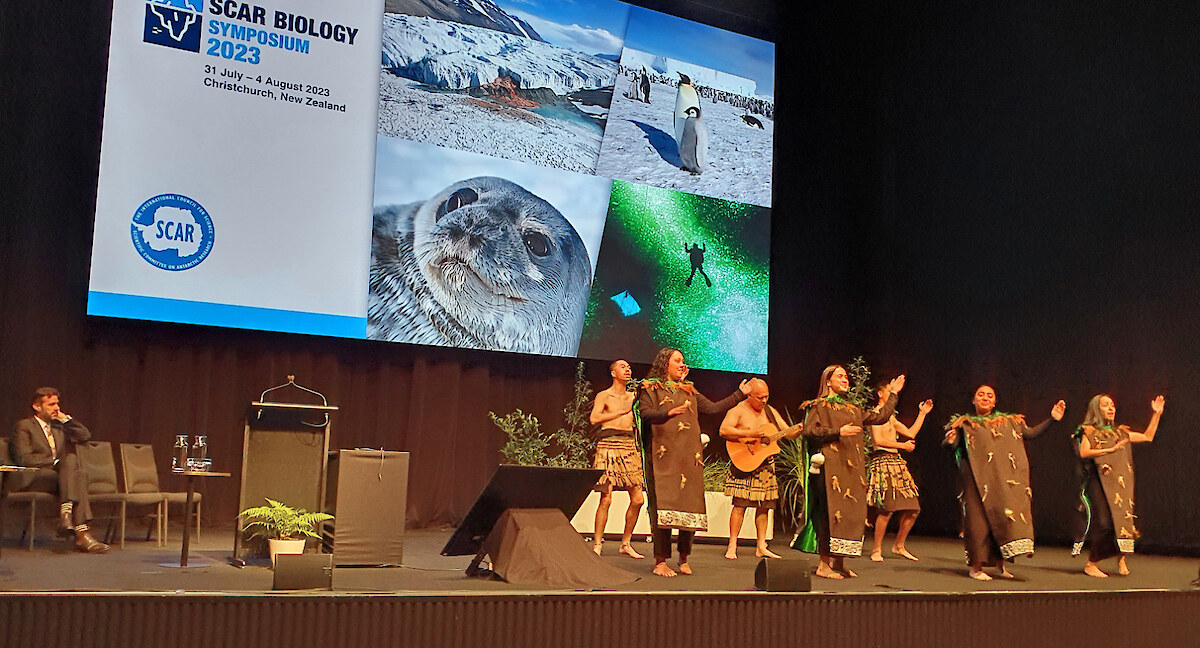 David Brennan and his team provided a fabulous performance for the conference participants
David Brennan and his team provided a fabulous performance for the conference participants
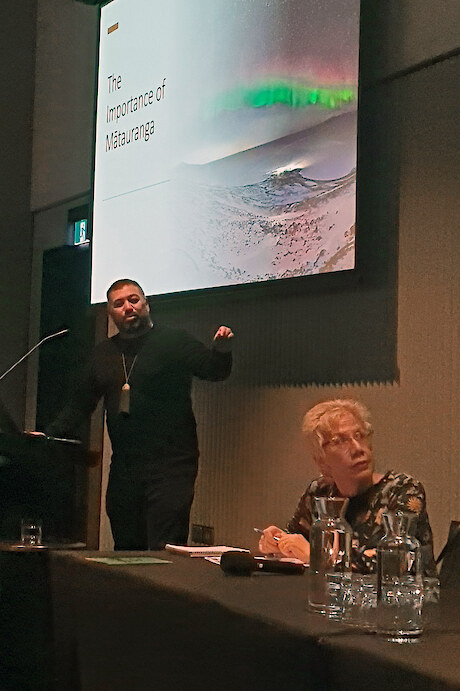 Tane Karepa (DOC) speaks about the importance of mātauranga in a session chaired by Prof Sandy Morrison (University of Waikato)After a break for morning tea, it was time to look to the future and introduce the international Antarctic community to the research and monitoring programme initiated by Murihiku Regeneration for the Ross Sea Sector in partnership with Christchurch-based Heritage Expeditions. The official programme launch presentation was supposed to be delivered by Programme Director Riki Nicholas, but he was unfortunately unable to attend. Tane Karepa (DOC) kindly took on the task of delivering Riki’s presentation on the Murihiku ki Te Tonga programme in addition to his own talk on the relevance of mātauranga for conservation and science. The talks were followed by a panel discussion, chaired by Prof Sandy Morrison of Waikato University, to answer audience questions and highlight different aspects of the proposed new programme. The response from the Antarctic science community was overwhelmingly positive. Speakers and panellists were approached by many local as well as international researchers keen to learn more about mātauranga and to collaborate with Murihiku Regeneration.
Tane Karepa (DOC) speaks about the importance of mātauranga in a session chaired by Prof Sandy Morrison (University of Waikato)After a break for morning tea, it was time to look to the future and introduce the international Antarctic community to the research and monitoring programme initiated by Murihiku Regeneration for the Ross Sea Sector in partnership with Christchurch-based Heritage Expeditions. The official programme launch presentation was supposed to be delivered by Programme Director Riki Nicholas, but he was unfortunately unable to attend. Tane Karepa (DOC) kindly took on the task of delivering Riki’s presentation on the Murihiku ki Te Tonga programme in addition to his own talk on the relevance of mātauranga for conservation and science. The talks were followed by a panel discussion, chaired by Prof Sandy Morrison of Waikato University, to answer audience questions and highlight different aspects of the proposed new programme. The response from the Antarctic science community was overwhelmingly positive. Speakers and panellists were approached by many local as well as international researchers keen to learn more about mātauranga and to collaborate with Murihiku Regeneration.
Photos: R. Eisert
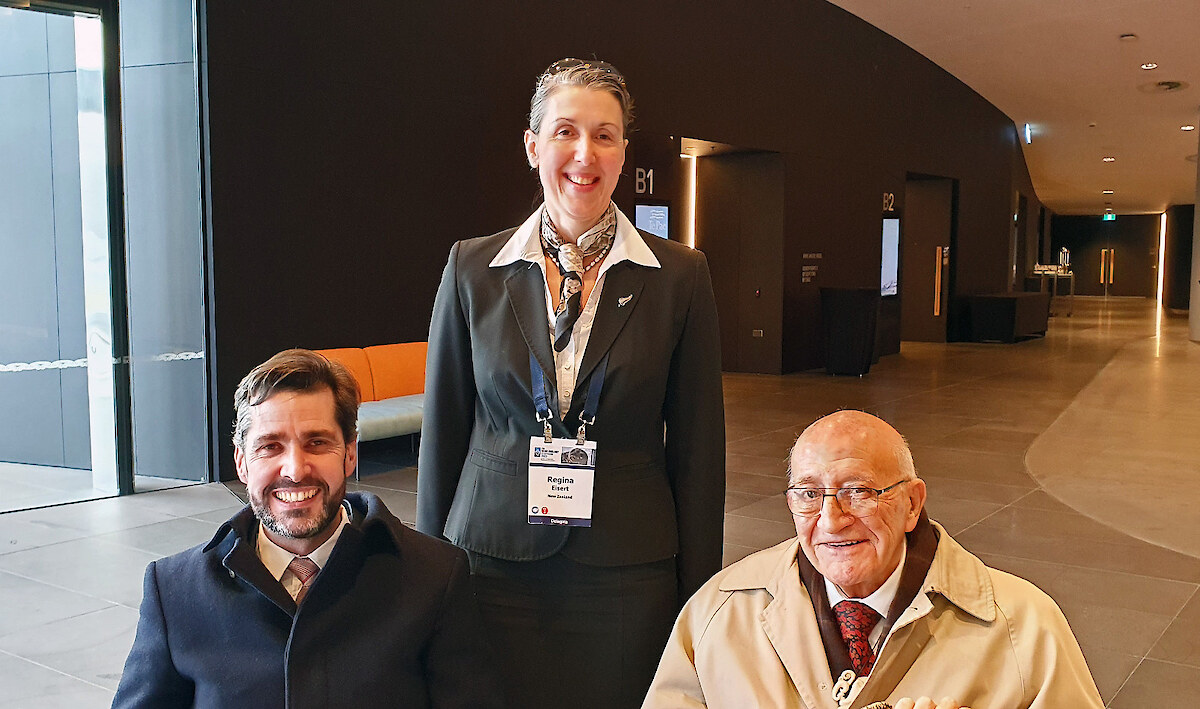 Dr Michael Stevens, Dr Regina Eisert, and Tā Tipene O’Regan at Te Pae Convention Centre
Dr Michael Stevens, Dr Regina Eisert, and Tā Tipene O’Regan at Te Pae Convention Centre
Posted: 4 August 2023
